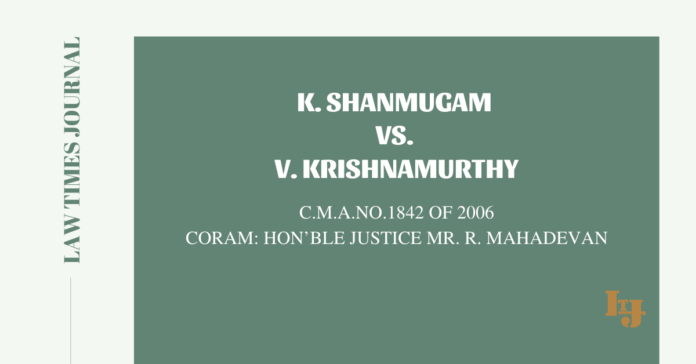
Before the High Court of Judicature at Madras
C.M.A.No.1842 of 2006
Petitioner
K. Shanmugam
Respondent
1. Krishnamurthy, Proprietor, Aviation Express, Chennai
2. United India Insurance Co. Ltd., Chennai
Date of Judgement
25 October 2019
Bench
Hon’ble Justice Mr. R. Mahadevan
Facts of the case
The appellant, who was in a drunken state, was riding his motorcycle. The ambassador car owned by the respondent 1, which was driven by his driver, came at a high speed and hit the claimant. Due to the accident, the appellant fell down and sustained fracture on his left ankle besides receiving multiple injuries all over his body.
He filed a petition before the Trial court claiming a compensation of Rs. 2,00,000. The tribunal held that the accident was caused due to rash and negligent driving of the driver of ambassador car which is owned by respondent 1 and insured with respondent 2. The Trial court decided that the accident was the result of contributory negligence of driver and that of the appellant. Hence, the total compensation was decided to be Rs. 65,880 out of which 60% was to be paid by respondent 2 and 40% to be paid by the appellant. Accordingly, the respondent 2 was ordered to pay a sum of Rs. 39,500 to the appellant. Believing the compensation to be inadequate, the appeal petition was filed before the Hon’ble HC.
Issues Raised
Following issues were raised before he Hon’ble HC:
1. Whether the compensation fixed by the Trial court is inadequate.
2. Whether the present case involves negligence on the part of appellant.
3. Whether 30mg per 100 ml as outer limit of alcohol consumption fixed under Section 185 of the Motor Vehicles Act, 1988 for a person driving the vehicle, is correct.
Arguments advanced
The counsel on behalf of the appellant argued that the trial court had wrongly fixed the 40% liability on the claimant as there were no concrete evidence supporting the involvement of the appellant in the accident due to the fact that he was in drunken state. Considering the fact that the claimant has suffered bi-Malleolus left ankle injuries and other serious injuries all over the body, the compensation awarded by trial court needs substantial enhancement.
The counsel on behalf of the respondent submitted that at the time of incident, the petitioner was in drunken state and hence was a tort-feasor to the accident. Further, it was argued that the Trial court had wrongly held respondent 2 liable for 60% compensation.
Decision of the Hon’ble HC
The HC, in the interest of society, security and well-being of the individuals, dismissed the appeal filed by the claimant and set-aside the decree passed by the trial court insofar it fastened the liability on respondent 2 at 60%. It was held that the claimant himself was the tort-feasor and was responsible for the accident. As such, the question of fastening liability either on the owner or on the Insurance Company does not arise. The court upheld the upper limit of 30mg per 100 ml as outer limit of alcohol consumption fixed under Section 185 of the Motor Vehicles Act, 1988.
Ratio Decidendi
Placing reliance on the judgements in State Tr. P. S. Lodhi Colony, New Delhi v. Sanjeev Nanda[1], D. Chandra Sekhar v. The State of Telangana, by Traffic Police Station[2] and State of Tamil Nadu Rep. by its Secretary v. K. Balu and another[3], the Hon’ble HC laid emphasis on adopting more stringent views on drunken driving. Further, the court recommended the Central Government is to consider a suitable amendment in this regard by allowing various State Governments / Union Territories to adopt a zero-tolerance norm in S. 185 itself. The time has now come for just such a measure as too many lives have already been lost to this social evil.
Edited by Sree Ramya
Approved & Published – Sakshi Raje
Reference
[1] State Tr. P. S. Lodhi Colony, New Delhi v. Sanjeev Nanda, S.L.P. (Crl.) No.3292 of 2010.
[2] D. Chandra Sekhar v. The State of Telangana, by Traffic Police Station, CRIMINAL REVISION CASE No.1625 OF 2018.
[3] State of Tamil Nadu Rep. by its Secretary v. K. Balu and another, (2017) 2 SCC 281.








